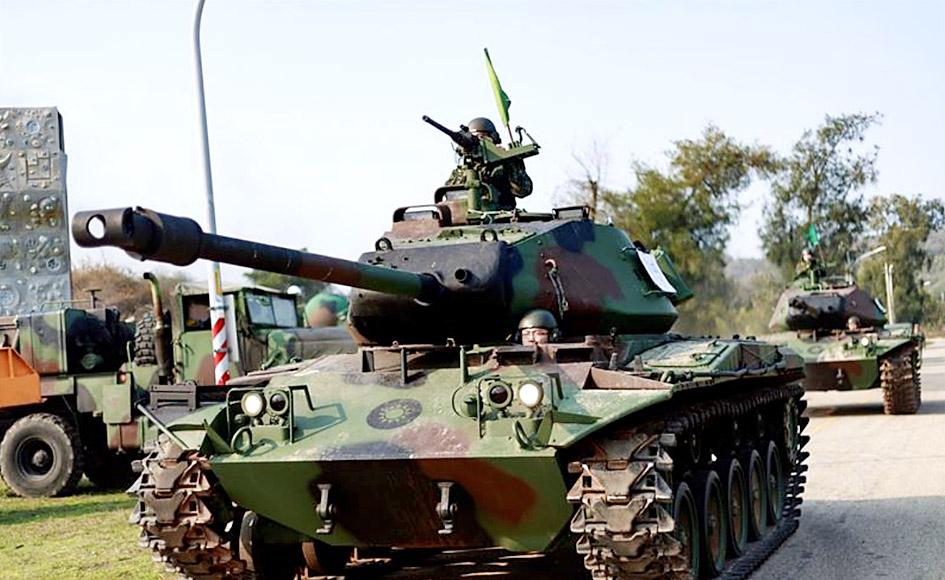The military plans on Friday to officially decommission its M41A3 Walker Bulldog light tanks after more than six decades of service, a military officer yesterday.
The decommissioning ceremony is to be held at the Army Infantry Training Command in Hsinchu County, with retired army generals and military personnel who used to operate the armored vehicles invited to attend, the officer said, asking to remain anonymous.
A parade featuring M41A3s is also set to be held during the event to give the tanks a proper send-off, they added.

Photo courtesy of Youth Daily News
Taiwan has less than 20 M41A3s. Military records show that the first batch of 46 M41A3s Taiwan bought from the US arrived in October 1958.
The tanks have served as the backbone of the army for decades, with more than 700 M41A3s in service at one point.
The army has gradually replaced them with more advanced M60A3, CM11 and CM12 tanks.
The M41D tank, an upgraded version of the M41A3, still serves on offshore Kinmen County’s Lieyu Islet near China.
The M41A3, which is part of the M41 line of light tanks named after US Army General Walton Walker, was developed by the US military immediately after World War II. Mounted with a 76mm main gun, the tank was designed for close infantry support and rapid airborne deployment.
With 5,000 units having been manufactured, the M41A3 played an important role in the Vietnam War.

Three Taiwanese airlines have prohibited passengers from packing Bluetooth earbuds and their charger cases in checked luggage. EVA Air and Uni Air said that Bluetooth earbuds and charger cases are categorized as portable electronic devices, which should be switched off if they are placed in checked luggage based on international aviation safety regulations. They must not be in standby or sleep mode. However, as charging would continue when earbuds are placed in the charger cases, which would contravene international aviation regulations, their cases must be carried as hand luggage, they said. Tigerair Taiwan said that earbud charger cases are equipped

Foreign travelers entering Taiwan on a short layover via Taiwan Taoyuan International Airport are receiving NT$600 gift vouchers from yesterday, the Tourism Administration said, adding that it hopes the incentive would boost tourism consumption at the airport. The program, which allows travelers holding non-Taiwan passports who enter the country during a layover of up to 24 hours to claim a voucher, aims to promote attractions at the airport, the agency said in a statement on Friday. To participate, travelers must sign up on the campaign Web site, the agency said. They can then present their passport and boarding pass for their connecting international

Temperatures in northern Taiwan are forecast to reach as high as 30°C today, as an ongoing northeasterly seasonal wind system weakens, the Central Weather Administration (CWA) said. CWA forecaster Tseng Chao-cheng (曾昭誠) said yesterday that with the seasonal wind system weakening, warmer easterly winds would boost the temperature today. Daytime temperatures in northern Taiwan and Yilan County are expected to range from 28°C to 30°C today, up about 3°C from yesterday, Tseng said. According to the CWA, temperature highs in central and southern Taiwan could stay stable. However, the weather is expected to turn cooler starting tonight as the northeasterly wind system strengthens again

Taiwan sweltered through its hottest October on record, the Central Weather Administration (CWA) said yesterday, the latest in a string of global temperature records. The main island endured its highest average temperature since 1950, CWA forecaster Liu Pei-teng said. Temperatures the world over have soared in recent years as human-induced climate change contributes to ever more erratic weather patterns. Taiwan’s average temperature was 27.381°C as of Thursday, Liu said. Liu said the average could slip 0.1°C by the end of yesterday, but it would still be higher than the previous record of 27.009°C in 2016. "The temperature only started lowering around Oct. 18 or 19